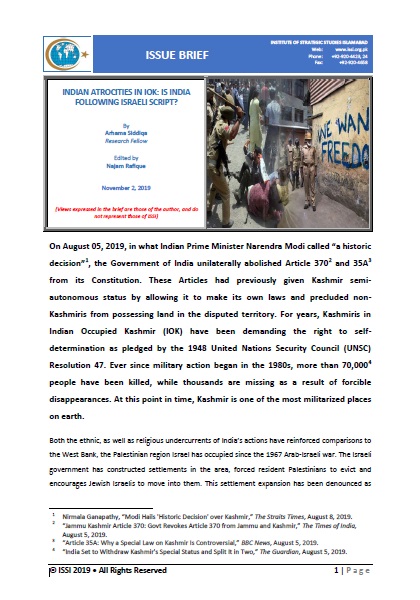On August 05, 2019, in what Indian Prime Minister Narendra Modi called “a historic decision”[1], the Government of India unilaterally abolished Article 370[2] and 35A[3] from its Constitution. These Articles had previously given Kashmir semi-autonomous status by allowing it to make its own laws and precluded non-Kashmiris from possessing land in the disputed territory. For years, Kashmiris in Indian Occupied Kashmir (IOK) have been demanding the right to self-determination as pledged by the 1948 United Nations Security Council (UNSC) Resolution 47. Ever since military action began in the 1980s, more than 70,000[4] people have been killed, while thousands are missing as a result of forcible disappearances. At this point in time, Kashmir is one of the most militarized places on earth.
Both the ethnic, as well as religious undercurrents of India’s actions have reinforced comparisons to the West Bank, the Palestinian region Israel has occupied since the 1967 Arab-Israeli war. The Israeli government has constructed settlements in the area, forced resident Palestinians to evict and encourages Jewish Israelis to move into them. This settlement expansion has been denounced as illegal by the UNSC.[5] The occupations of Palestine and Kashmir are not completely identical. There are certain legal differences between the two states. However, Israeli and Indian ambitions are not unalike. It can be said that in some ways, they feed off each other. India and Israel bonhomie has swiftly cultivated into an effective partnership primarily based on strategic interests. The relationship also now encompasses economic dimensions such as agriculture. India’s oppression of Kashmiris, cannot be seen in a vacuum. Tel Aviv continues to play a crucial role by collaborating with Delhi to ensure that Kashmiris remain a subordinated people.[6]















